Following a prolific junior hockey career with the Sudbury Wolves, during which he scored 40 goals and 107 points while accumulating 184 penalty minutes in 61 games after being drafted by the New Jersey Devils at the 1982 NHL Entry Draft,
Pat Verbeek made his debut with the Devils for the final six games of the season, where he made an impression with 3 goals and 5 points.
He returned to New Jersey the following season and made the club out of training camp. He immediately set the tone for the rest of his career by playing in 79 games, the first of 11 consecutive seasons of 73 games or more, despite his hard nosed, all-in style of play which saw him lead the Devils in penalty minutes as a rookie and register 10 seasons with 150 minutes or more, with four of those being well over 200.
During his six seasons with the Devils, Verbeek broke out of the gate as a rookie with 20 goals and 47 points. After a step back as a sophomore, his goal totals rose from 25 to 35 and eventually a career high an club record of 46 in 1987-88, along with 31 assists for 77 points while surpassing 200 penalty minutes for the first time with 227 as well as a +29 rating, a true star among fantasy hockey players!
That season, the Devils qualified for the playoffs for the first time since the franchise moved from Colorado, where they were known as the Rockies. Not content just to be in the postseason, Verbeek and the Devils went on a run to the conference finals, ousting the New York Islanders in 6 and beating the Washington Capitals on the road in Game 7 before taking the Boston Bruins the full distance before succumbing. Verbeek set a career best with 12 playoff points in 20 games.
Verbeek's reputation for toughness was only added to just after the 1984-85 season ended when he had one of his thumbs was severed by an auger in a farming accident. His brother drove Pat 20 miles to the hospital, only without the missing portion of his thumb. After phoning home, his father Gerry was able to locate the severed portion and deliver it to the hospital, where, after six and a half hours of surgery, the top half of his digit was reattached and his other cut fingers treated. Pat was able to recuperate over the summer and returned in time for training camp without missing a single regular season game.
Following a down season in 1988-89, during which he scored 30 points less than the previous season, Verbeek was dealt to the Hartford Whalers during the off season, but not until he had made his World Championships debut for Canada in 1989. He immediately rebounded offensively with back to back 40 goal seasons with 44 goals and setting a career high with 89 points in 1989-90 followed by 43 goals and 82 points in 1990-91, when he was named team captain, to lead the team in scoring, all while agitating his way to seasons of 228 and 246 penalty minutes. During both of those seasons, he was the only player to lead his team in both goals and penalty minutes.
He would play three more seasons in Hartford, including making his first NHL All-Star Game in 1991 and another 80 point season in 1992-93, when he lit the lamp 39 times and just missed 200 penalty minutes with 197 as he totaled 82 points. He also led the club in scoring a second time in 1993-94 with 75 points.
During the strike-shortened 1994-95 season, Verbeek was traded to the New York Rangers after 29 games with Hartford. In his 19 games in Manhattan, Verbeek was given the nickname "The Little Ball of Hate" by teammate Glenn Healey. The following season he recorded his fourth and final 40 goal season with 41 on his way to his fourth and final 80 point season with 82 while being named to his second all-star game in 1996.
For the 1996-97 season, Verbeek signed with the Dallas Stars as a free agent, which had an immediate affect on his offensive numbers, as Dallas was not a wide open offensive club, combined with the game changing to a more defensive style in the latter half of the 1990's. While his point total did decrease to 53 his first season with the Stars, it was enough for him to place second on the team in scoring. Also during the 1996-97 season, Verbeek would play in his 1,000th career game on this date, picking up an assist in the Stars 3-2 win over the Mighty Ducks of Anaheim.
Verbeek would finish third in team scoring despite his increase in points to 57, 12 off the team lead of 69. Dallas would make their presence known in the postseason, making it to the conference finals in 1998 before falling to the eventual champions.
That playoff experienced served the Stars well, as they again made a long postseason run in 1999, sweeping the Edmonton Oilers in four, eliminating the St. Louis Blues in six and defeating the Colorado Avalanche in a seven game struggle to advance to the finals against the Buffalo Sabres, where the Stars won the first Stanley Cup of Verbeek's career.
For the 1999-00 season, Verbeek left Dallas when he signed a free agent contact with the Detroit Red Wings, During that season he scored 22 goals and 26 assists, including his 1,000th career point, making him only the second player in NHL history to record 1,000 career points and 2,500 career penalty minutes, along with Dale Hunter.
Less than a month later, he would reach another significant milestone with his 500th career goal, making him the first player in NHL history with 500 goals and 2,500 penalty minutes.
He would play one more season for the Red Wings before returning to Dallas as a free agent for his final NHL season in 2001-02.
He would finish his career with 1,424 games played, 522 goals and 541 assists for 1,063 points and 2,905 penalty minutes during a career in which he never played a single game in the minor leagues. He would also score 26 goals and 36 assists for 62 points in 117 playoff games while being whistled for 225 penalty minutes in the playoffs.
Internationally, Verbeek competed for Canada at the 1983 World Junior Tournament, scoring 4 points in 7 games, the 1989 and 1994 World Championships as well as the 1996 World Cup of Hockey.
Today's featured jersey is a
1996-97 Dallas Stars Pat Verbeek jersey. This jersey was first worn during the Stars third season in Dallas, the 1995-96 season> This was the first season the sleeve and waist stripes were made much larger than previously and the name "Dallas" was added to the main crest. This style was worn through the 1999-00 season.
Bonus Jersey: Today's bonus jersey is a 1989-90 Hartford Whalers Pat Verbeek jersey from one of Verbeek's seasons of being the only player in the NHL to lead his team in goals and penalty minutes.
This jersey can be identified as a 1989-90 jersey by the straight stripes on the arms, worn this way only two seasons, one of which was 1991-92 when the jersey was adorned with the NHL 75th Anniversary patch.
For all other years of this style, the sleeve stripes were at an angle across the arms.
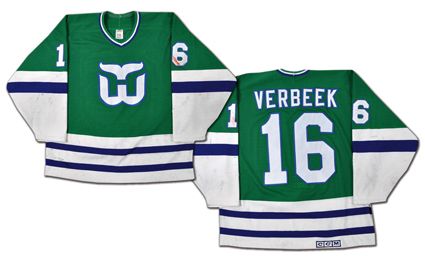
Extra Bonus Jersey: Today's extra bonus jersey is a
1996 Canada National Team Pat Verbeek jersey as worn during the 1996 World Cup of Hockey, one of Verbeek's four appearances for Canada on the international stage.
Canada was one of three teams to wear Bauer jerseys, with the other two being Sweden and the Czech Republic. The Bauer teams were the only three to wear the larger 4 inch diameter World Cup logo patches and Canada was the only one of those to wear the patch on the chest rather than the upper left arm.
Today's first video shows Verbeek getting nailed but bouncing right back up again.
Next, Vebeek discusses the Hartford Whalers being "in" with the fans at the 2011 Whale Bowl outdoor game in Hartford which featured an alumni game between the Whalers and Bruins alumni teams. Note the original Whalers jerseys and the terrific Bruins throwbacks created just for this game.
Finally, Verbeek promoting his anti-odor product,
Beek's Reek Out at the Let's Play Hockey Expo in St. Paul, Minnesota.

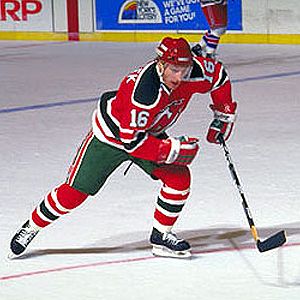
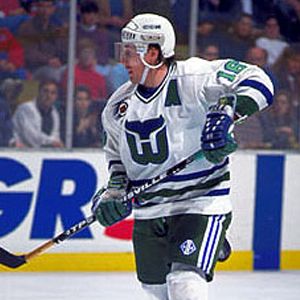
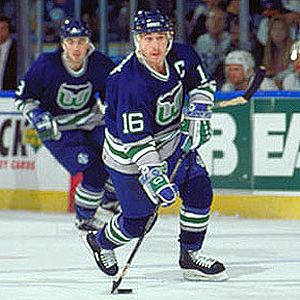
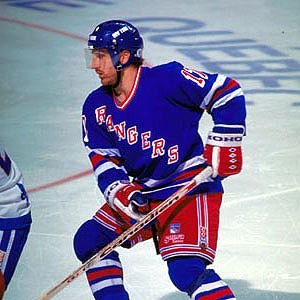
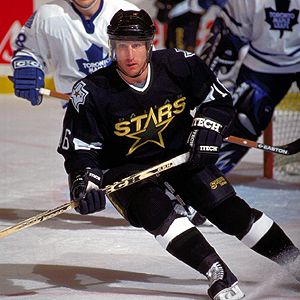
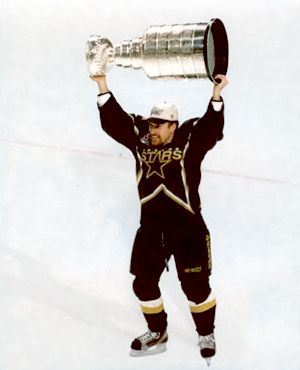
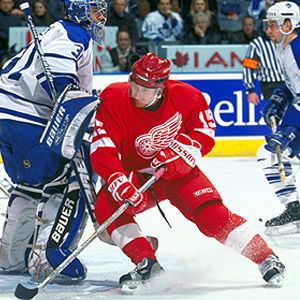
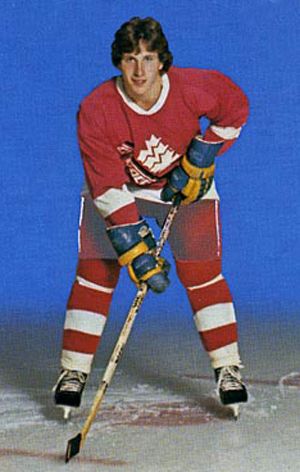
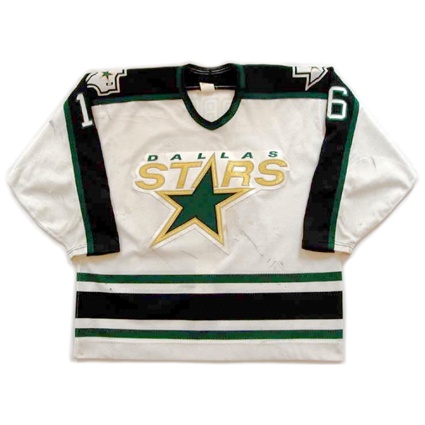
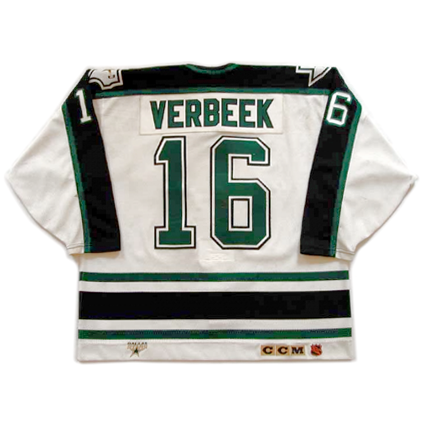

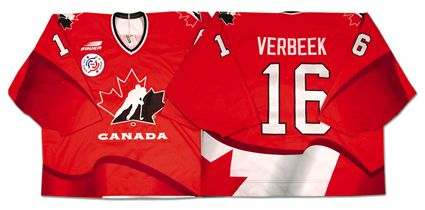










No comments:
Post a Comment
We welcome and encourage genuine comments and corrections from our readers. Please no spam. It will not be approved and never seen.